If you’re looking for the best project management tool, you’ve probably come across Asana and Notion. Both are powerful productivity platforms, but they serve different purposes.
So, which tool is right for you? In this guide, we’ll compare Asana vs Notion, covering their key features, pricing, integrations, and real user reviews to help you make the best choice for your workflow.
🔍 Asana vs Notion: Key Differences Explained
🟢 Asana Strengths:
✔ Best for task & project management
✔ Built-in collaboration & workflow automation
✔ Easy-to-use UI for teams & businesses
✔ Time tracking & reporting features
🔵 Notion Strengths:
✔ Highly customizable workspace for personal & team use
✔ Combines notes, tasks, wikis & databases
✔ Supports templates & integrations (Perfect for creative workflows)
✔ Great for knowledge management & documentation”
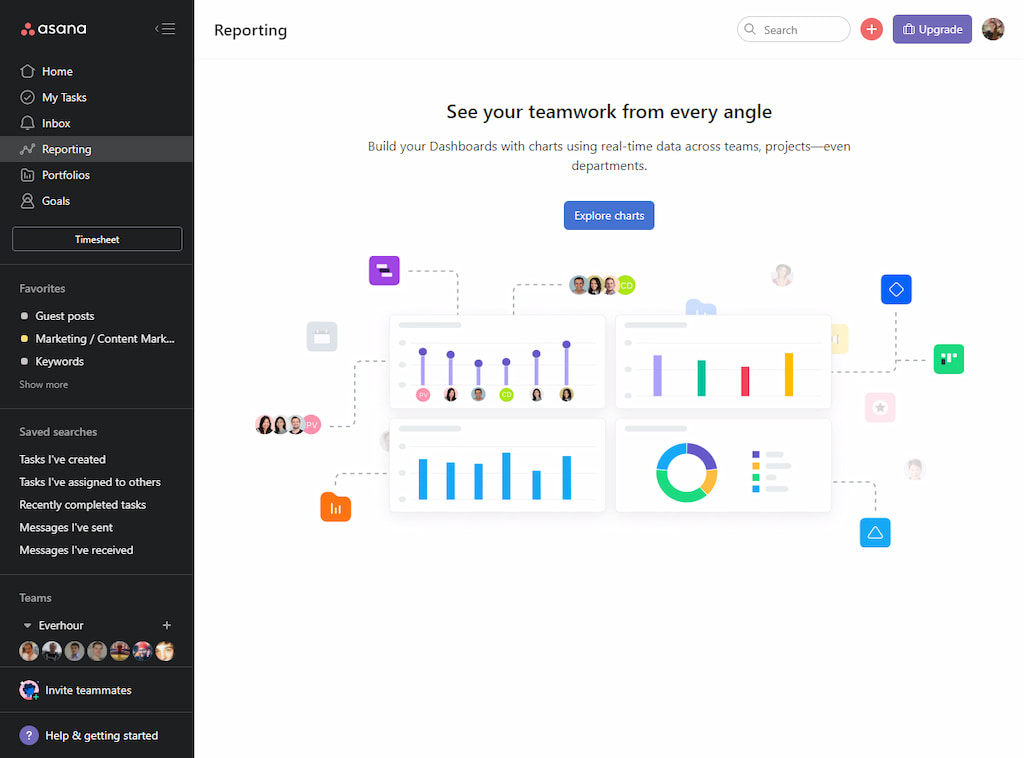
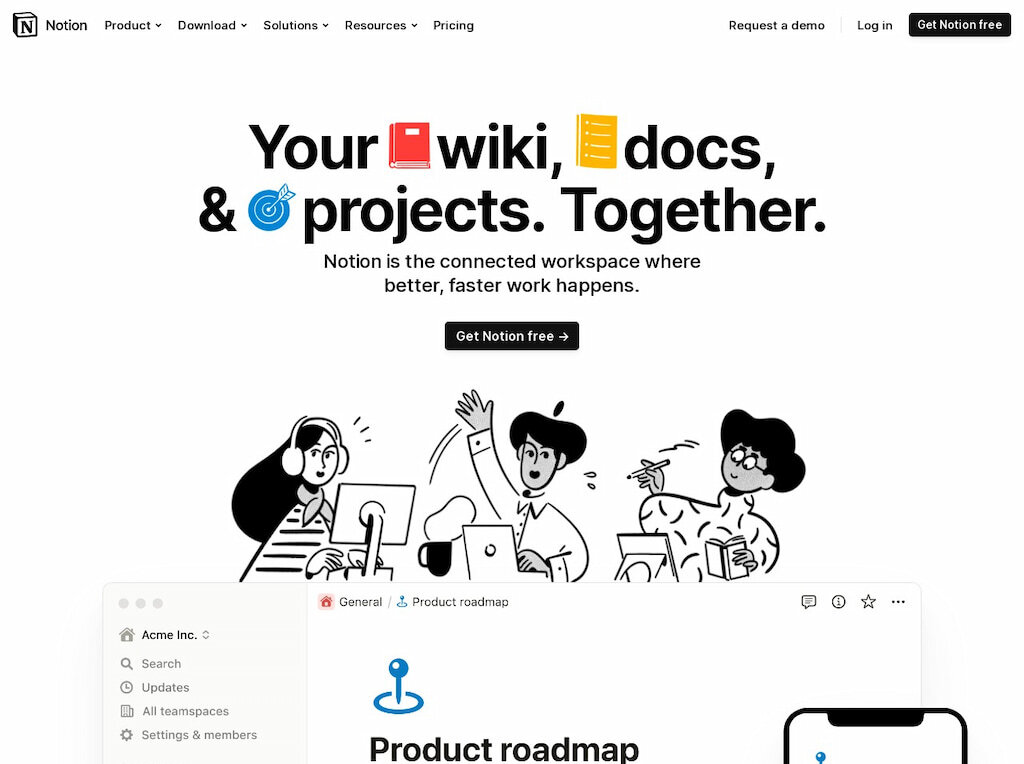
🚀 Is Notion an Asana Alternative? (What You Need to Know)
Notion can be considered a competitor of Asana in some aspects, but it’s not a direct replacement for it. Notion is more focused on personal productivity and knowledge management, while Asana is more focused on team collaboration and project management. However, Notion can be used to complement Asana by providing a central place for notes, documents, and other project-related information. You can import Asana projects into Notion very easily.
🔥 Why Is Notion So Popular? Top Features & Use Cases
Notion has gained popularity in recent years because of its flexibility and customization options. It can be used for a variety of purposes, such as note-taking, task management, project tracking, and more. Notion’s templates and database features allow users to create custom solutions that fit their specific needs.
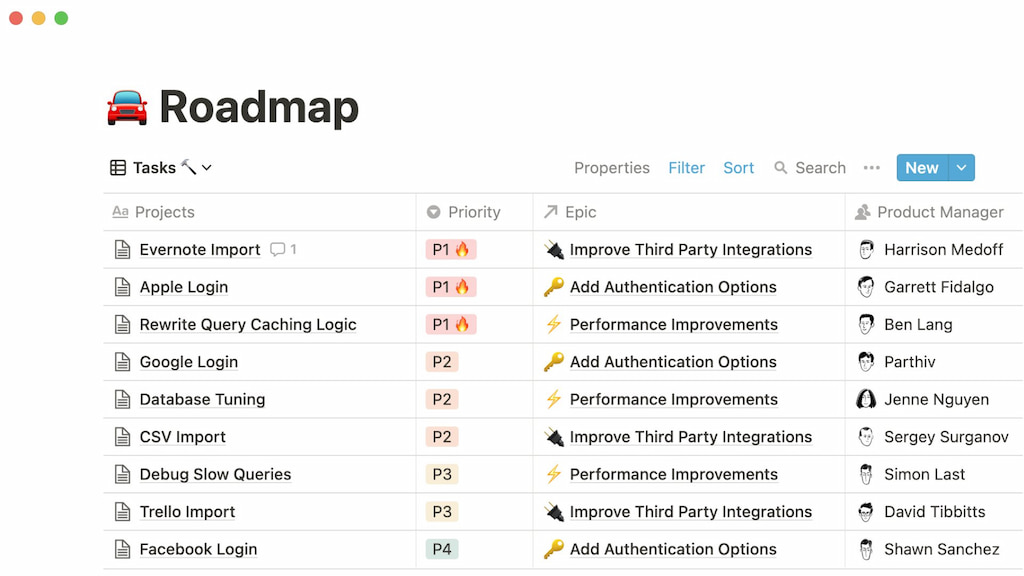
Additionally, Notion’s intuitive interface and extensive documentation make it easy for users to get started and learn how to use the tool effectively.
💡 When Is Notion the Better Choice Over Asana?
Notion is a great choice for individuals and teams who want a flexible and customizable workspace. Notion’s templates and database features allow users to create custom solutions that fit their specific needs. Notion’s powerful search function makes it easy to find information quickly, and its ability to embed and link pages and databases make it easy to navigate and access information. Additionally, Notion’s free plan offers a generous amount of features and functionality.
📊 Can Notion Be Used for Project Management?
Notion can be used for project management, but it’s not created specifically for this purpose as Asana. Notion’s flexibility and customization options make it a great tool for creating project plans, tracking tasks, and collaborating with team members.
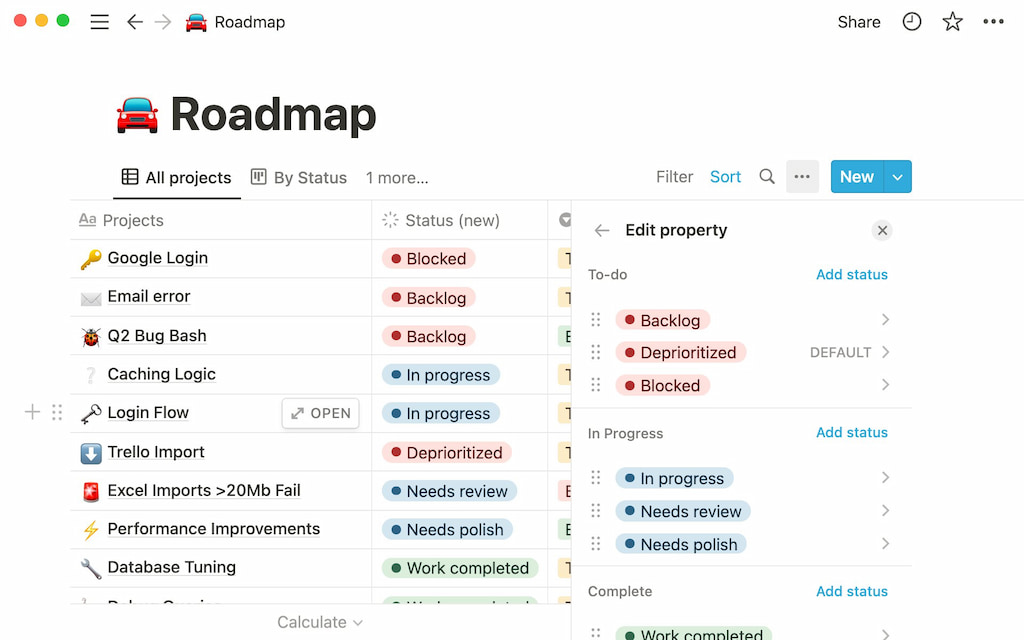
However, Asana’s features like task dependencies, progress tracking, and project templates make it a better choice
🔗 How to Integrate Asana & Notion for Seamless Workflows
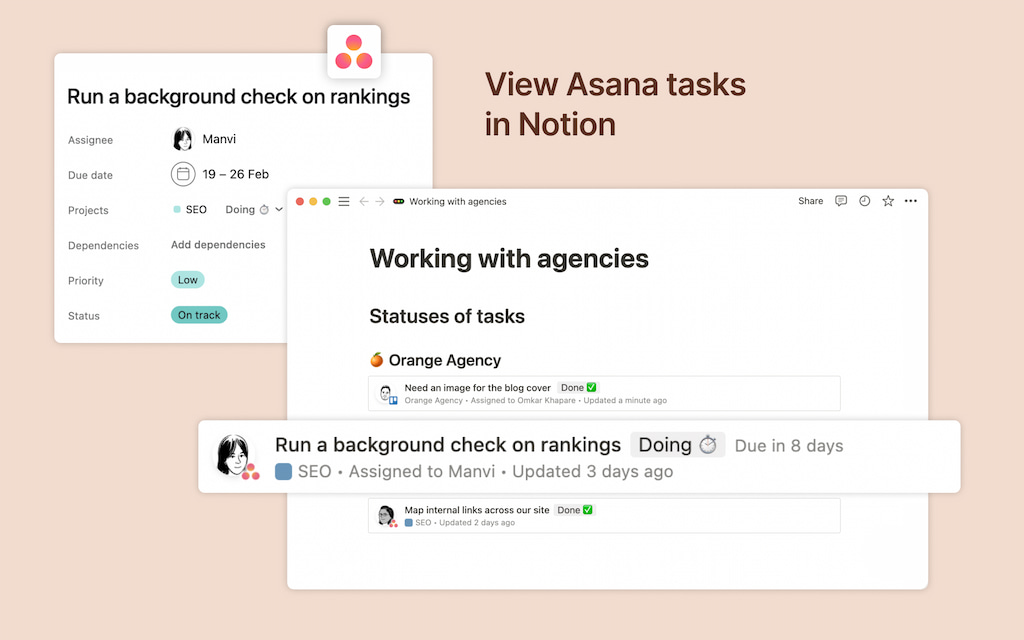
Option 1: Using Zapier
- Create a Zap that triggers Notion updates when an Asana task is created.
- Automate status updates & database syncs.
Option 2: Using Notion API
- Set up a custom integration for real-time Asana updates in Notion.
- Requires API key & basic coding knowledge.
Option 3: Using Unito (Best for Teams)
- Two-way sync between Asana & Notion.
- Best option for managing large projects across both platforms.
🔒 Is Notion Secure? Data Privacy & Encryption Explained
Notion offers various privacy and security features to ensure the safety of your data. You can use two-factor authentication, encrypt your content, and restrict access to specific pages. You can also choose to enable a feature that makes your pages invisible to search engines, which adds an extra layer of security.
However, it is important to note that Notion is a cloud-based service, which means that your data is stored on Notion’s servers.
While Notion claims to protect your data, there is always a risk of data breaches, and you should take measures to protect your information.
💰 Is Notion Really Free? Understanding Its Pricing Plans
Yes, Notion offers a free plan, but it has some limitations. With the free plan, you can create up to 1,000 blocks (a block is a piece of content, like text, an image, or a video) and have access to basic features like templates and sharing. If you need more blocks, advanced features, or integrations, you will need to upgrade to a paid plan, which starts at $5 per user per month.
🤔 Is Notion Hard to Use? A Beginner’s Perspective
Notion interface can be overwhelming at first, but once you get used to it, it can be very intuitive and easy. Notion’s flexibility and customization options can make it a bit challenging to learn, but it also means that you can use it in many different ways. Notion provides helpful guides and video tutorials to help you get started, and their customer support team is very responsive and helpful.
⚠️ Asana & Notion Limitations: What You Should Know
💡 Asana’s main limitation is its pricing model. While it offers a free plan, it has limited features and is only suitable for small teams. Asana’s paid plans can be expensive, especially if you have a large team or need advanced features. Additionally, Asana interface can seem challenging which may make it difficult to navigate and use effectively.
💡 Notion’s main limitation is its lack of robust project management features. While it can be used for project management, it is not as feature-rich as other dedicated project management tools like Asana. Notion also lacks some basic features like recurring tasks, which can be a deal-breaker for some users.
✅ Asana vs Notion: Pros & Cons Compared
Here are the main pros and cons of Notion and Asana based on user reviews on Capterra:
Notion Pros:
- High level of customization
- Ability to link and integrate various types of content
- User-friendly interface
- Suitable for personal and team use
- Good for knowledge management
Notion Cons:
- Limited project management features
- Some features are not intuitive to use
- The mobile app can be buggy
- Customer support can be slow
Asana Pros:
- Strong project management features
- User-friendly interface
- Good for team collaboration
- Wide range of integrations (especially Everhour + Asana for time tracking, project billing, and budgeting)
- Good customer support
Asana Cons:
- Very expensive for larger teams
- The steep learning curve for some users
- Some features are limited in the free version
- The interface can be cluttered
Overall, Notion is praised for its customization options and flexibility but criticized for its limited project management features and occasional technical issues. Asana, on the other hand, is famous for its project management capabilities and user-friendly interface, but criticized for its pricing and complexity.
⭐ User Reviews: Notion & Asana Based on Real Experience
📌 Notion User Review: What Users Love & Hate
“I absolutely love Notion. It’s an incredibly versatile tool that can be customized to suit almost any need. I use it for everything from project management to personal goal tracking to meal planning. The user interface is clean and intuitive, and I love the ability to link different types of content together. Notion is also constantly improving and adding new features. I can’t recommend it enough.” – 5 stars, Emily M.
📌 Asana User Review: Strengths & Weaknesses
“Asana is the most comprehensive task manager out there. With the ability to assign, prioritize and track progress on multiple projects in one place, Asana has become an essential tool for our team. What sets Asana apart from other task managers is the ability to collaborate with team members and monitor progress in real-time. It has been a game changer for our organization.” – 5 stars, Andy G.
If you are managing a team of 5 or more and looking to boost efficiency, Everhour is the perfect tool to keep your team on track. With seamless time tracking, you can easily estimate task durations, set clear budgets, and generate detailed reports inside Asana, Trello, Jira, or any other pm tool.
🔎 Read user reviews for more insight on Everhour:
“The integration with Asana is perfect. My team started to use on the very same day it was implemented – it really easy to use. Review collected by and hosted on G2.com.” [Daniela, G2]
“Everhour is a streamlined, easy-to-use time tracking tool that has many great features. The most useful to our company, however, is the fluid integration with Asana.” [Zach, G2]
“Very good experience. It’s pretty intuitive and works pretty well for my purposes. Easy to use with Asana. Very user friendly.” [Alex, Capterra]
🏆 Asana vs Notion: Final Verdict (Which One Should You Pick?)
In conclusion, both Asana and Notion are powerful tools that can help you manage your tasks, projects, and information effectively. Asana is a great choice if you’re looking for a dedicated project management tool with robust features and integrations, but it can be expensive and complex. Notion, on the other hand, offers more flexibility and customization options, but it may not be as suitable for project management and can be overwhelming to learn. Ultimately, the choice between Asana and Notion depends on your specific needs and preferences. Read our article on Asana vs ClickUp, Coda vs Notion, Asana vs Trello vs Monday, Asana vs Todoist, Basecamp vs Notion, or Notion vs Monday to learn how PM tools fare against other powerful PM tools.
If you’re also curious about how different roles contribute to project success, check out our breakdown of project manager vs product manager vs program manager.

